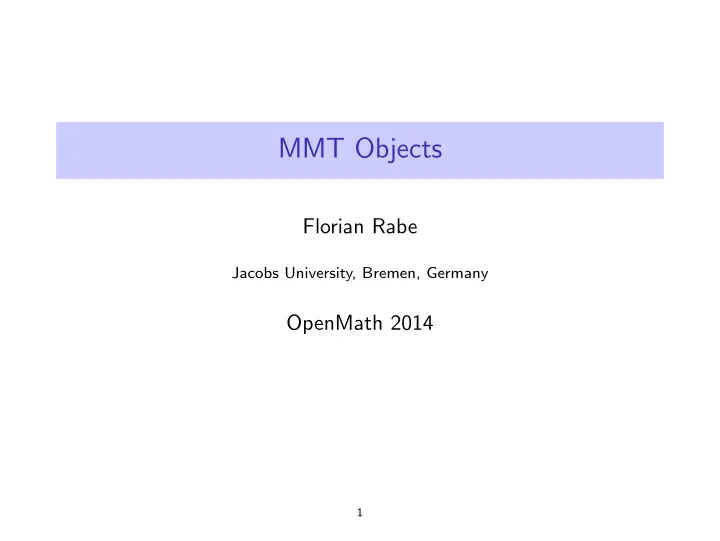

MMT Objects Florian Rabe Jacobs University, Bremen, Germany OpenMath 2014 1
Overview ◮ Major OpenMath -based experiment/system ◮ MMT ◮ Universal representation language for formal logical content inspired by OpenMath , OMDoc ◮ Implementation with generic support for logical and knowledge management functionality e.g., module system, type reconstruction; presentation, editing ◮ Object layer uses OpenMath as primary data structure 2
Point of This Talk ◮ Describe differences between Mmt objects and OpenMath objects ◮ Provide additional information for further development of OpenMath ◮ Not a ◮ position paper ◮ standard enhancement proposal Mmt ’s deviations may or may not be good for OpenMath 3
Grammars c : reference to symbol/constant (OMS) x : reference to variable (OMV) OpenMath objects ::= I ( i ) | F ( f ) | S ( s ) | BA ( b ) O | c | x | A ( O , O ∗ ) | AT T ( O ; KV ∗ ) | B ( O ; AT T ( x ; KV ∗ ) ∗ ; O ) | E ( c ; O ∗ ) (key-values lists) ::= c �→ O KV Mmt L c ( s ) objects ::= E | c | x | c ( γ ; Γ; E ∗ ) contexts Γ ::= ( x [: E ][= E ]) ∗ substitutions γ ::= ( x = E ) ∗ 4
Literals OpenMath ◮ 4 fixed literal types: integers, float, string, byte array ◮ concrete syntax fixed by standard ◮ side note: OpenMath standard CDs define no operations on strings or byte arrays Mmt literals L c ( s ) ◮ extensible set of literal types like extensible set of symbols ◮ no individual literal types built-in ◮ c is symbol whose documentation defines ◮ syntax (string encoding) ◮ semantics (valid values and their meaning) of string s , which represents the literal value 5
Attributions OpenMath ◮ attributed variables in particular needed for type attributions ◮ semantically attributed objects does anybody use this? ◮ ignorable attributions Mmt : no attributions ◮ contexts declare variables x [: E ][= E ] effectively 2 built-in attribution keys AT T ( x ; [ type �→ T ] , [ def �→ D ]) ≃ x [: T ][= D ] ◮ ignorable attributions as extra-linguistic metadata somewhat similar to HTML + RDFa 6
Errors OpenMath ◮ Explicit error objects Mmt : no errors ◮ error objects recovered as special case of application objects 7
Complex Objects OpenMath ◮ 4 constructions: attribution of key-value list, error, application, binding ◮ Note: ◮ attribution and binding are purely structural ◮ error implies semantic properties ◮ application is in between is function application semantics implied or not? Mmt ◮ single construction c ( γ ; Γ; � E ) ◮ purely structural ◮ named children γ ◮ bound variables Γ ◮ unnamed children (in scope of bound variables) ◮ each construction labeled with symbol c ◮ semantics of c ( γ ; Γ; � E ) defined solely by semantics of c 8
Complex Objects (2) OpenMath - Mmt correspondence O ≃ E If ≃ ≃ O i E i and V j X j , then for applications: A ( c , O 1 , . . . , O n ) ≃ c ( · ; · ; E 1 , . . . , E n ) bindings: B ( c ; V 1 , . . . , V m ; O 1 ) ≃ c ( · ; X 1 , . . . , X n ; E 1 ) errors: E ( c ; O 1 , . . . , O n ) ≃ c ( · ; · ; E 1 , . . . , E n ) 9
Complex Objects (3) ◮ What does γ do in c ( γ ; Γ; � E )? ◮ Generalization beyond application and binding objects ◮ Substitution γ used for ◮ named arguments in function application ◮ records ◮ list of cases in pattern-match 10
Conclusion ◮ Mmt grammar uses only 4 productions ◮ constants ◮ variables ◮ literals ◮ complex objects ◮ OpenMath uses 10 productions ◮ 4 kinds of literals ◮ 4 kinds of complex objects ◮ Mmt loses some expressivity, especially for applications ◮ But gained simplification crucial in Mmt implementation 11
Recommend
More recommend